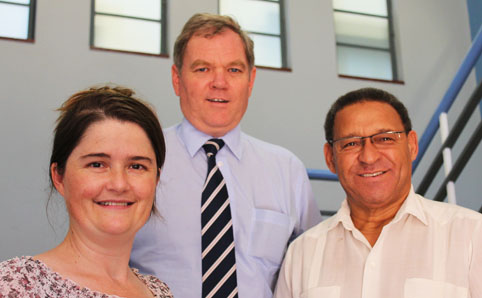Latest News Archive
Please select Category, Year, and then Month to display items
06 November 2023
|
Story MBALI MABOEA
|
Photo SUPPLIED
 The Department of Geography on the UFS Qwaqwa Campus recently played host to the Society of South African Geographers Conference (SSAG 2023), which gathered more than 100 students over three days.
The Department of Geography on the UFS Qwaqwa Campus recently played host to the Society of South African Geographers Conference (SSAG 2023), which gathered more than 100 students over three days.
Fostering academic growth, collaboration, and inspiration among students and researchers in the field of geography, the Department of Geography on the UFS Qwaqwa Campus recently played host to the Society of South African Geographers Conference (SSAG 2023), which gathered more than 100 students over three days.
Following a five-year hiatus, the three-day conference comprised student proposal presentations in different fields: human geography, environment geography, geoinformatics, and physical geography, divided into breakaway sessions over two days. Furthermore, day three of the annual conference included an excursion to the Basotho Cultural Village and Clarens.
The three-day annual student conference focused on different themes presented by two main speakers. The topic of the first keynote speaker, Dr Mahlomola Daemane, General Manager of the SANParks Arid Research Unit, focused on the contemporary conservation, transition, and relevance of science in policy and decision making.
The second keynote speaker was Dr Felicia Akinyemi, a Marie Sklodowska-Curie Research Fellow affiliated with the Institute of Geography at the University of Bern in Switzerland. Her work focuses on the intersection of geoinformatics, global change, and sustainability. Dr Akinyemi focused her talk on the integrative geospatial methods and metrics for sustainable land use. She introduced different techniques and metrics and gave students insight in early-career African research.
Speaking about the success of the conference, Nthebohiseng Sekhele, Geography Lecturer on the Qwaqwa Campus and chair of the organising committee, said, “The local organising committee was also very impressed with the quality of presentations from our postgraduate students in Geography, as well as the robust discussions that happened during the parallel sessions in the two days of the conference. We had a positive response of physical and online participation from many universities across South Africa. We are pleased that we have achieved our goal with this conference, which is to inspire the next generation of geographers.”
Do universities need theology faculties?
2012-03-27
 |
|
From left to right: Ms Anlené Taljaard, Department of Systematic Theology, Prof. Francois Tolmie, Dean: Faculty of Theology and Prof. Alan Boesak of the International Institute for Studies in Race, Reconciliation and Social Justice. All three are from the UFS.
Photo: Leonie Bolleurs
27 March 2012
|
Challenges facing training in theology in South Africa was the focus of a public lecture by Prof. Alan Boesak of the International Institute for Studies in Race, Reconciliation and Social Justice at the university. Prof. Boesak is one in a series of speakers who were invited by the university’s Faculty of Theology to discuss the broader theme of the transformation of knowledge. The presence of a faculty of theology at a public university has been a point of discussion in many circles.
“Our country needs an RDP of the soul and who better than the theology faculties to make a contribution in this regard?” asked Prof. Boesak.
“An important challenge for a faculty of theology lies in the content that theology students learn. Does the content reflect the context of South Africa today? Theology students must be prepared to make a positive, meaningful contribution in their congregations and communities within the realities of South Africa,” Prof. Boesak said.
Prof. Boesak’s lecture was attended by not only lecturers and students in theology, but also staff members from several other departments on the university’s Bloemfontein Campus.
Several national and international speakers will present guest lectures during the year in order to sketch a more complete picture of the “transformation of knowledge”.